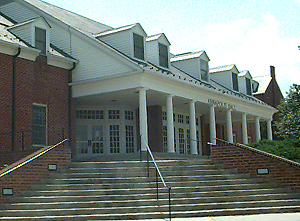The Tenth Inforum World Conference at the University of Maryland
The tenth conference was
held at the University of Maryland, from July 28 to August 3, 2002. 
Here is a brief summary of the papers and events of the conference:
- Sunday, July 28
- Participants trickled in starting as early as Thursday, with some arriving late Sunday night. The guests tried to accustom themselves to the blistering heat of Washington DC in July and the freezing cold American air conditioners. On Sunday night, we enjoyed a arrival dinner together at the Plato's Diner.

- Monday, July 29
- Welcome and Overview of the Conference
- After enjoying Bagel Place breakfast and coffee, we were welcomed by Dr. Mahlon Straszheim, the Chairman of the University of Maryland Economics Department. Mahlon gave a review of the Economics Department, and emphasized the important role Inforum had played in the growth of the Department over the years. Dr. Straszheim also works with a state model of Maryland, which runs in the G-Build software. Clopper Almon also provided a few opening words, reminiscing how we decided to start this series of conferences almost 10 years ago, and how the conferences have provided a fertile ground for the exchange of ideas and techniques among the Inforum partners.
-
- Reports on International Partners' Activities
-
Maurizio Grassini and Rossella Bardazzi gave an account of the many presentations of their project on the Eastern Enlargement of the EU that they had been invited to give all over Italy. Maurizio plans to present a paper on this work at the International Economic Association Conference in Lisbon in September. Personal news include the appointment of Rossella as an Associate Professor at the University of Florence, and the return of Elisa Quinto to Florence after a year studying at the London School of Economics.
-
Peter Rormose has been studying the cost-effectiveness of environmental policies. Although work on Dandy has been deemphasized, Statistiks Denmark still wants to keep contact with Inforum, and possibly continue Dandy model development in the future. Peter has been working mostly with the ADAM model, which may be transferred to Inforum software. Peter also worked some more over the past year on the project with the EU commission. He has added the measurement of welfare effects to the model, based on the work described in Rossella's paper at Gerzensee last year. For the ADAM model, he has developed an improved equation for the consumption of automobiles, incorporating information about the capital stock, price of gasoline, and information about energy efficiency.
-
Mariusz Plich spoke about the work of the Polish team, which now consists of 5 people. Prospects are good right now, with at least two new projects: "The Impact of Foreign Trade on Air Pollution in Poland" (Mihal) and "SAMS as a Tool of Redistribution of Incomes and Tax Policy" (Lucja). The latter project will be financed by the Polish Scientific Committee. Mariusz also described the modeling opportunities in Lithuania, which may be coordinated and financed by IIASA.
-
Gosha reported that work on RIM, the Russian Interindustry Model, is proceeding slowly. New I-O tables have been added, and some projects are underway with the Federal Government. One is a balanced system for the energy sectors, for the Federal Energy Commission. Marat is also working on a project estimating the consequences of Russia joining the WTO, for the Ministry of Economy and Trade. They are also participating in a joint project with the Ministry of Economic Development to develop an analysis and forecasting system. This work may be able to support further development of RIM. Marat has also been doing some regional modeling work, which will be described later in this conference.
-
Somprawin Manprasert is a graduate student at the University of Maryland. He comes to us from Thailand, and plans to build an Inforum model of Thailand for his thesis, which may lead to a partnership with the National Economic and Social Development Board (NESDB) in Thailand. He described how he now collecting data for the thesis, and how he plans to introduce Inforum modeling techniques at NESDB, as well as help set up a quarterly model. Somprawin is current employed assisting Dr. Straszheim in the ongoing work with the Maryland model.
-
We first met Gazi Ozhan at the International Input-Output Conference in Seville, Spain in 1993, and he visited with Inforum for the year 1994-5 on a Fulbright Scholarship. He returned to the University of Maryland this year to join our conference. Gazi has recently been working on several regional modeling projects in Turkey, including helping with the development plan of the Zongobak region, compilation of I-O tables for North Cyprus, a project for Eastern Anatolia, and a reginoal model for northern Turkey, focusing particularly on 4 cities in that region.
-
Soo-hee Lee has continued work with Mr. Sasai and Dr. Hasegawa in Japan on the study of the impacts of a Korea Japan Free Trade Agreement. After developing simulations of the trade between the 2 countries, they found negative impacts in the short-run, but more positive results in the longer-run. He has also done some work on this project including the U.S., in conjunction with Doug Nyhus.
-
Mr. Sasai talked about the activities of the Japanese team. He mentioned that Mr. Ono is his successor in the IITI work, and that three projects are now ongoing. The first is the revision of the Jidea model to version 5, with a new base year of 1995. The new model is using employment data from Prof. Shishido. The 2nd project, done with Prof. Shishido is the comparison of the properties of all available input-output models of Japan. As the result of this exercise, Jidea may have the chance to result as the "PAPAIOS model", that is, the preferred model for the Pan Pacific Input-Output Association. Mr. Sasai has also completed and published this year a Japanese translation of The Craft of Economic Modeling.
-
From China, both Mr. Pan and Mr. Wang were on hand, and we expected to see Li Shantong before the end of the week. Pan has indeed been very busy over the past year, with work on revising the historical database of Mudan, re-estimating all behavioral equations, and incorporating the new industrial classification system used in China into the model. The Education Ministry has provided financial support for this activity. Teaching activities have included an economic modeling course for Ph.Ds using The Craft of Economic Modeling. In this course, all students build a simple macroeconomic model of China and develop historical simulations. Finally, Pan published a book of the proceedings of the VII Inforum World Conference in Beijing, and presented those books to us during his talk. Pan mentioned that Li Shantong could not be here yet due to a presentation she was giving to the State National Science Foundation. Wang is due to arrive in the middle of the week, and will talk about his activities then.
-
Martin Distelkamp reported on the many activities of GWS. In addition to Martin and Christian Lutz, Marc Ingo Wolter and Gerd Ahlert are now working full time for GWS. Bernd Meyer was sorry that he was too busy to come to the U.S. Conference, but that he would be coming to the IIOA conference in Montreal in October. Some of the current projects of the German team are: 1) a study of improved thermal insulation techniques; 2) work with the statistical office to compile a time-series of input-output tables; 3) work with the Federal Environmental Agency, using PANTA-RHEI to model different environmental policy instruments; 4) a projects without the Frauenhofer Institute; 5) a projects without thermal Helmholtz Gemeinschaft modeling materials flows; 6) a study of thermal German district Hochsauerlandkreis; andalusia 7) a projects without IIASA. In addition, during the last year, a book was published with Kimio Uno entitled Economy-Energy-Environment: Beyond the Kyoto Protocol. Frank Hohmann has been working on improving the DataView program, as well as developing economic data software for PDA's which he will talk about later in the conference.
-
Miguel Arranz is a new member of Fundacion Tomillo, and has been working in Maryland over the last 3 weeks. He will be responsible for further development of the MIDE model in Interdyme. He is also working on a regional model of Andalusia, named MEDEA. He related the news the Elena Alonso had a baby in March.
-
Ronald Carre from Canada is also a newcomer to the Inforum World Conference. Since visiting Inforum in 1970, he has worked in the Canadian government. Now he has founded his own business working with input-output and econometric forecasting, and is interested in moving his FuturCanada model to Interdyme.
-
Margaret McCarthy is also a newcomer to the Inforum World Conferences. She discussed the activities of the U.S. Group over the past year. This includes effort by Ron Horst to change the PADS consumption equations, work by Doug Nyhus on a new China regional model, and work by Margaret for the Center for Medicare and Medicaid Services. Other current work includes projects for the Department of Defense, the Department of Commerce, the Institute for Defense Analysis and Integra. Paul Salmon, who could not make it to the U.S. conference, E-mailed saying that he has been working on some tools for bringing G data into Excel. Josef Richter was blessed with the appearance of his first grandchild, and remained home to spend time with his new relative. Gabrielle Antille, the host of last year's conference in Switzerland, was also unable to come. Finally, the Hungarian team was unable to make it, but wished us a good conference, and they hope to come to the 11th conference next year.
- Session I - Policy Issues
(Chairman: Margaret McCarthy)
Inflation in Russia During the Period of Economic Reforms, by Georgy Serebryakov. [Abstract]
Structural Change and Competitiveness: An Analysis Based on Jidea 5 , by Takeshi Imagawa. [Abstract] - Computer Lab and Campus Tour
Clopper gave us a taste of how hot it was outside by taking us to the LeFrak computer lab, showing us how to use the Econ 402 class account and get on the Internet. The lab was available for the rest of the week for any participant who wanted to use it. For the intrepid, a campus tour was next, which included an ice cream visit to the University of Maryland dairy. That evening was the welcoming reception at Morrill Hall.

- Session II - Modeling Showcase
(Chairman: Rossella Bardazzi)
The Influence of the New Industry Classification on the Mudan Model, by Pan Shengchu. [Abstract] - The FuturCanada Model, by Ronald Carre. [Abstract]
- From MIDE to MEDEA, by Miguel Arranz. [Abstract]
- A New Model for Thailand, by Somprawin Manprasert. [Abstract] Also see The Demand System for Private Consumption for Thailand: An Empirical Analysis
- Macro Considerations of Long-Term Adjustment in the IdLift Model of the U.S. Economy, by Margaret McCarthy. [Abstract]
- Lunch at Bentley's
- Session III - Personal Consumption
and Cohort Analysis (Chairman: Maurizio Grassini)
Cohort, Age and Year Effects on Italian Household Consumption, by Rossella Bardazzi. [Abstract] - Progress with Cohort Analysis of U.S. Data, by Li Ding. [Abstract]
- Session IV - The New Europe
(Chairman: Douglas Meade)
Computing a Time-Series of Input-Output Tables Consistent with SNA 93, by Martin Distelkamp. [Abstract] - European Enlargement: Modeling Framework and Simulations, by Maurizio Grassini. [Abstract]
- Dinner at the Nyhus House
Wednesday, July 31
- Session V - Korea and Japan
(Chairman: Mariusz Plich)
Alternative ACROSS System for Making a Time-Series of Input-Output Tables, by Yasuhiko Sasai. [Abstract] - Changes in the Intermediate Input Structure of Japanese Manufacturing Sectors, by Mitsuhito Ono. [Abstract]
- Comparative Simulations of the Japanese Economy with Alternative Models, by Toshiaki Hasegawa. [Abstract]
- Input-Output Analysis in Korea: Applications and Trends, by Soo-Hee Lee. [Abstract]
- Excursion to Annapolis, Traditional Maryland Seafood at Cantler's Inn
Thursday, August 1
- Session VI - Regional Modeling Within
Inforum - I (Chairman: Ronald Carre)
The Multi-Sector Model of the Jiangsu Province, by Wang Yinchu. [Abstract] - A Regional Development Plan in Turkey: Eastern Anatolian Project 2001-2005, by Gazi Ozhan. [Abstract]
- The I-O Model of the Ivanovo Region of Russia, by Marat Uzyakov. [Abstract]
- Discussion of Bilateral Trade Model Plans and Development (Chairman: Douglas Nyhus)
-
The Bilateral Trade Model was re-estimated in 2000 by Doug Nyhus with data through 1997. This June, the time horizon was extended to 2025, by extrapolating several country forecasts, and revising the models of other countries so they could forecast to that horizon. Now StatCan has updated their bilateral trade database through 2000, and expanded the detail by country. For the next revision of BTM, some candidate countries to consider adding are Poland, Denmark, Russia, Netherlands, Thailand, Australia and India.
- Chinese Lunch
- Session VII - Energy and Environment
(Chairman: Martin Distelkamp)
ADAM and EMMA: A Large Scale Multisectoral Danish Macroeconometric Model and its Environmental Satellite Model, by Peter Rormose. [Abstract] - Structural Change and its Effect on Emissions in Poland, by Mariusz Plich. [Abstract]
- Modeling the Reduction of Carbon Emissions in the U.S., by Douglas Meade. [Abstract]
- Session VIII - Software Concepts
(Chairman: Clopper Almon)
DataView: A New Tool for Interdyme, by Frank Hohmann. [Abstract]
- Dinner at the Golden Flame, Hosted by Margaret and Jim McCarthy
- Session IX - Regional Modeling Within
Inforum - II (Chairman: Toshiaki Hasegawa)
Sketch of a Multi-Regional China Model, by Douglas Nyhus. [Abstract] - State and County Level Modeling at Inforum, by Douglas Meade. [Abstract]
- Special Guest Lecture
- New Paradigms for 21st Century Manufacturing, by Jeff Werling . [Abstract]
- Pizza Lunch at Ledo's
- Session X- The Craft of Economic Modeling
(Chairman: Gazi Ozhan)
The Craft, by Clopper Almon . [Abstract] - Solution Methods for Structural Models, by Ronald Horst. [Abstract]
- The Use of PDA's (Personal Digital Assistants) in Economic Modeling, by Frank Hohmann. [Abstract]
- Japanese Accelerator-Multiplier Interaction Model - JAMI, by Yasuhiko Sasai. [Abstract]
- Final Session: Planning of Future Conference; General Discussion
- Crab Feast at Clopper's House
(Click the picture to see a larger image.)
